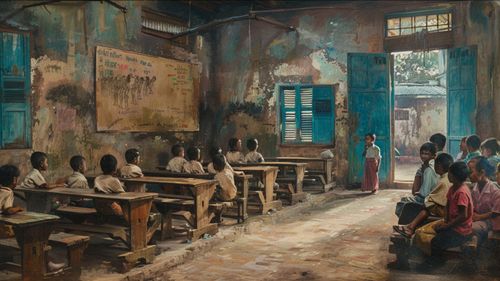"An Elementary School Classroom in a Slum" Summary: The Powerful Social Commentary of Spender's Poem
Feb 15, 2024 · 2 mins read
0
Share

"An Elementary School Classroom in a Slum" is a powerful poem by British poet Stephen Spender, exposing the devastating effects of urban poverty on children's education.
Save
Share
Spender, born in 1909, was a staunch advocate for social justice, and this poem reflects his political voice, highlighting the stark contrast between the privileged and the underprivileged.
Save
Share
The poem's setting is a classroom in a slum, where children's faces are "like rootless weeds" and their bodies are "weighed-down" by poverty.
Save
Share
The donations on the classroom walls, such as Shakespeare's head and a map of the world, offer cruel, false promises to students who have little hope of escaping their circumstances.
Save
Share
The poem's theme of poverty is universal, transcending nationalities, races, and ethnicities, and it's a commentary on the oppressive power of capitalism.
Save
Share
Spender's cynicism is evident when he calls Shakespeare "wicked" and the map a "bad example," suggesting that the beauty of the world is a temptation to steal for those trapped in poverty.
Save
Share
The poem's form is free verse, and it employs allegory, with the classroom and children representing the struggle between the proletariat and the bourgeoisie.
Save
Share
Spender's Marxist leanings are evident in the poem, as he calls for a complete subversion of the dominant social model to address the educational crisis caused by poverty.
Save
Share
The poem's final stanza offers a glimmer of hope, urging society to break open the windows of the classroom and show the children a world of green fields and azure skies.
Save
Share
"An Elementary School Classroom in a Slum" is a timeless piece that resonates with the ongoing struggle for equality and justice, and it's a call to action for meaningful, systemic change
Save
Share
0